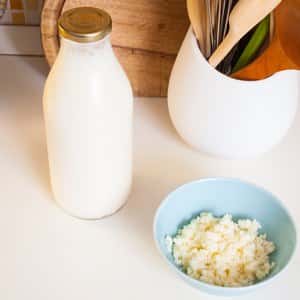
Have you been looking for a way to boost your immune system? Especially during the season when colds and flu are rampant, many people would like to know how to recover from an infection more readily. One reader suggests that drinking kefir could help, and there is a little scientific research that suggests she might be right.
What Could Help a Person Recover from an Infection?
Q. Many years ago, one of my customers told me that her doctor suggested that she begin drinking kefir daily if she wanted to stop getting sick. Not having any idea what the heck kefir was, I nodded and said that was interesting. Then I promptly forgot about it.
A couple of years later, I had a tough time with a respiratory infection. I noticed kefir in the natural section of our grocery store. I remembered what she’d said and bought some. Long story short: it worked.
I haven’t been sick for more than two years. I now make my own water-based kefir so I can drink it every day. Certainly, other things help too: sensible hand washing, along with more home-cooked meals with lots of veggies and leafy greens.
My husband thinks I am nuts brewing kefir, but he drinks it when he gets sick. He finds it helpful to recover from his infection quickly, but he has to drink some every day.
The healthy bacteria living in the kefir apparently diversify your gut bacteria, helping you protect yourself from germs. From my experience, this works best as a preventative or consumed as soon as you know you are getting sick. You don’t have to drink the entire carton all at once, just a few sips throughout your day.
What Is Kefir?
A. Kefir (ku-FEER) is fermented milk. People use specific bacteria (a starter, in the case of kefir, in the form of kefir “grains”) to create this slightly sour-tasting beverage. If you want to increase your intake of probiotic foods, kefir is a good place to start.
How Does Kefir Affect the Immune System?
Most of the research on its effects on health and infection has apparently focused on its ability to help people ward off nasty intestinal bacteria such as Salmonella or E. coli (Iraporda et al, Journal of Dairy Research, Aug. 2017). The lactic and acetic acids (and possibly other compounds) produced by the kefir-fermenting microbes inhibit the growth of many pathogenic bacteria.
Components of this fermented milk product activate human immune cells in tissue culture (Ghoneum et al, International Journal of Immunopathology and Pharmacology, Dec. 2015). The investigators suggest that this might mean kefir consumption could help in fighting viral infections.
Should You Drink Kefir?
We don’t know for sure that this will help you recover from an infection more quickly, but it is worth a try. You don’t have to make your own kefir unless you want to. This once exotic-seeming product is now available in grocery store dairy cases around the country.
If you acquire a taste for kefir, you may reap additional health benefits. Studies suggest that it can promote better cholesterol levels, lower blood pressure, more rapid wound healing and less susceptibility to allergies and asthma (Bourrie, Willing & Cotter, Frontiers in Microbiology, May 4, 2016). If you buy it in the supermarket, look for kefir that has not been highly sweetened.

